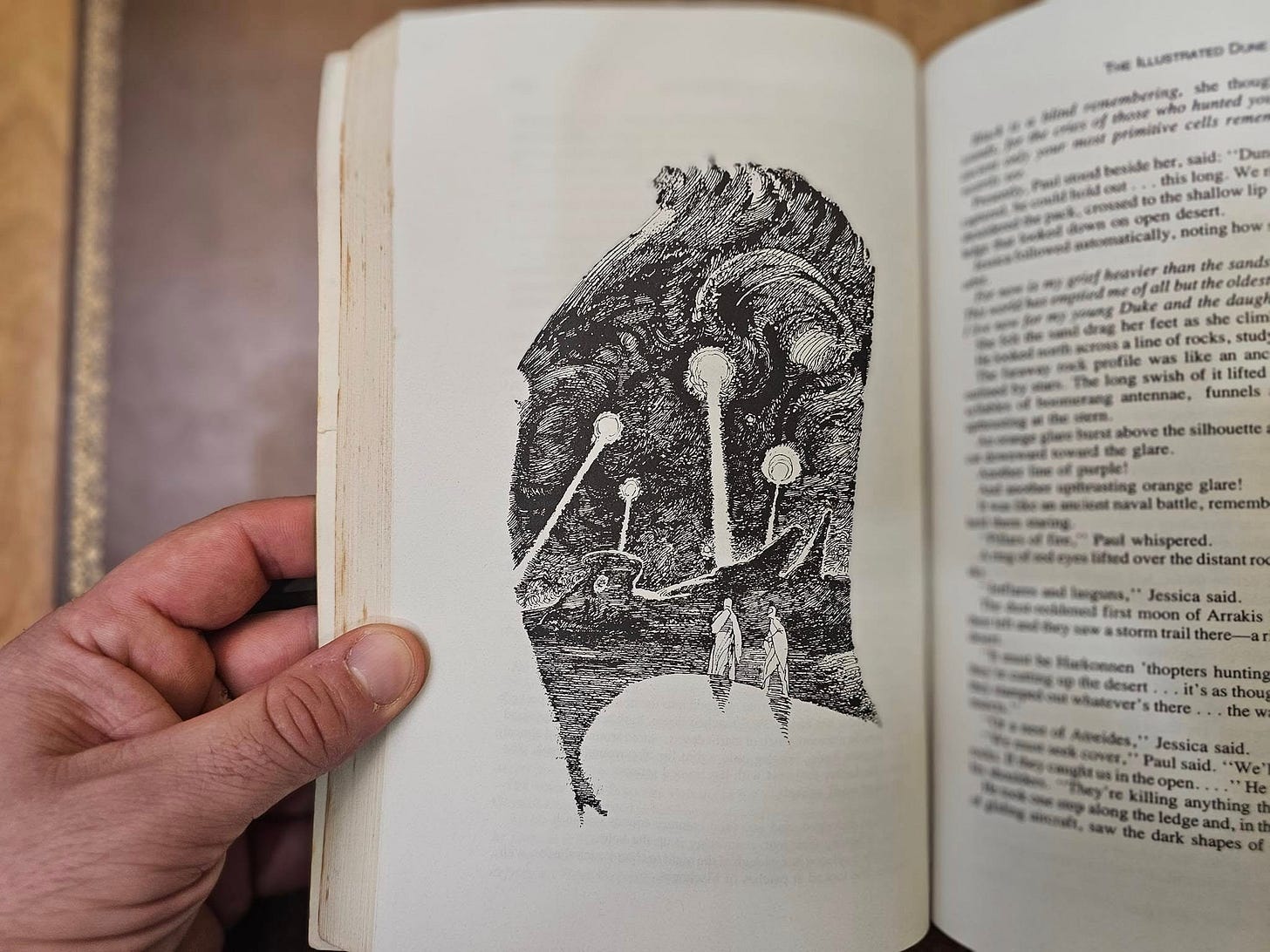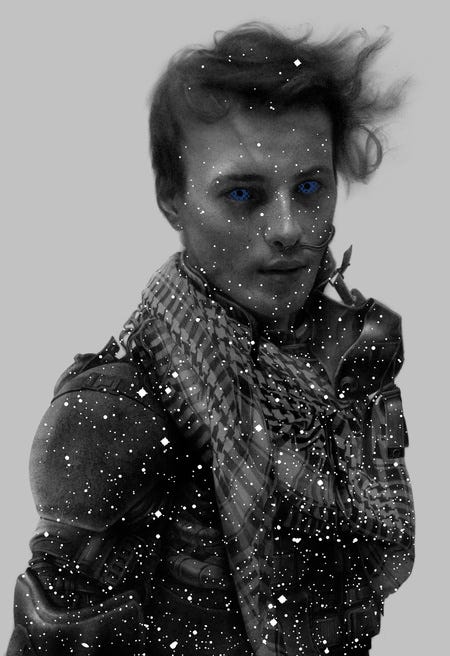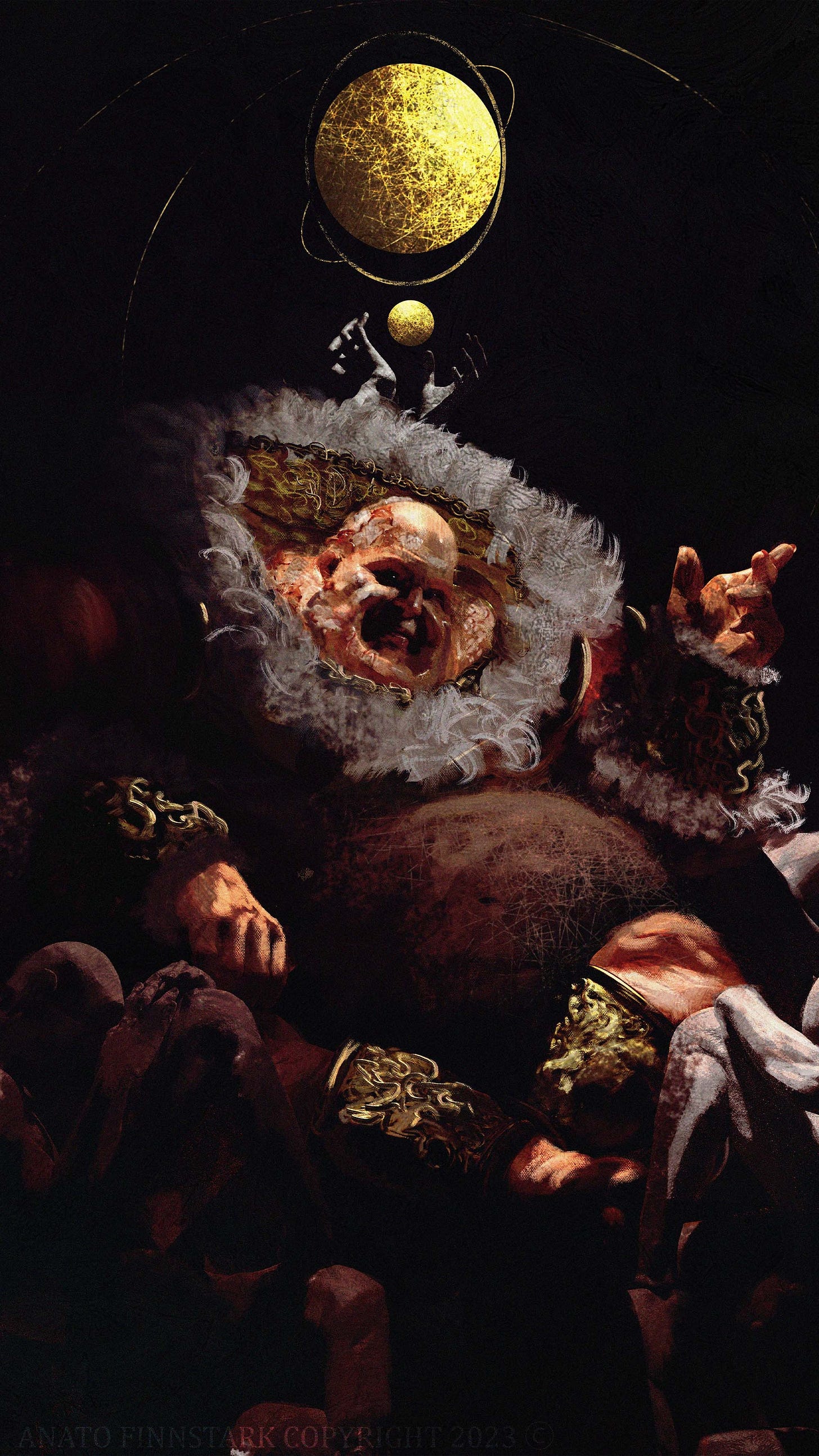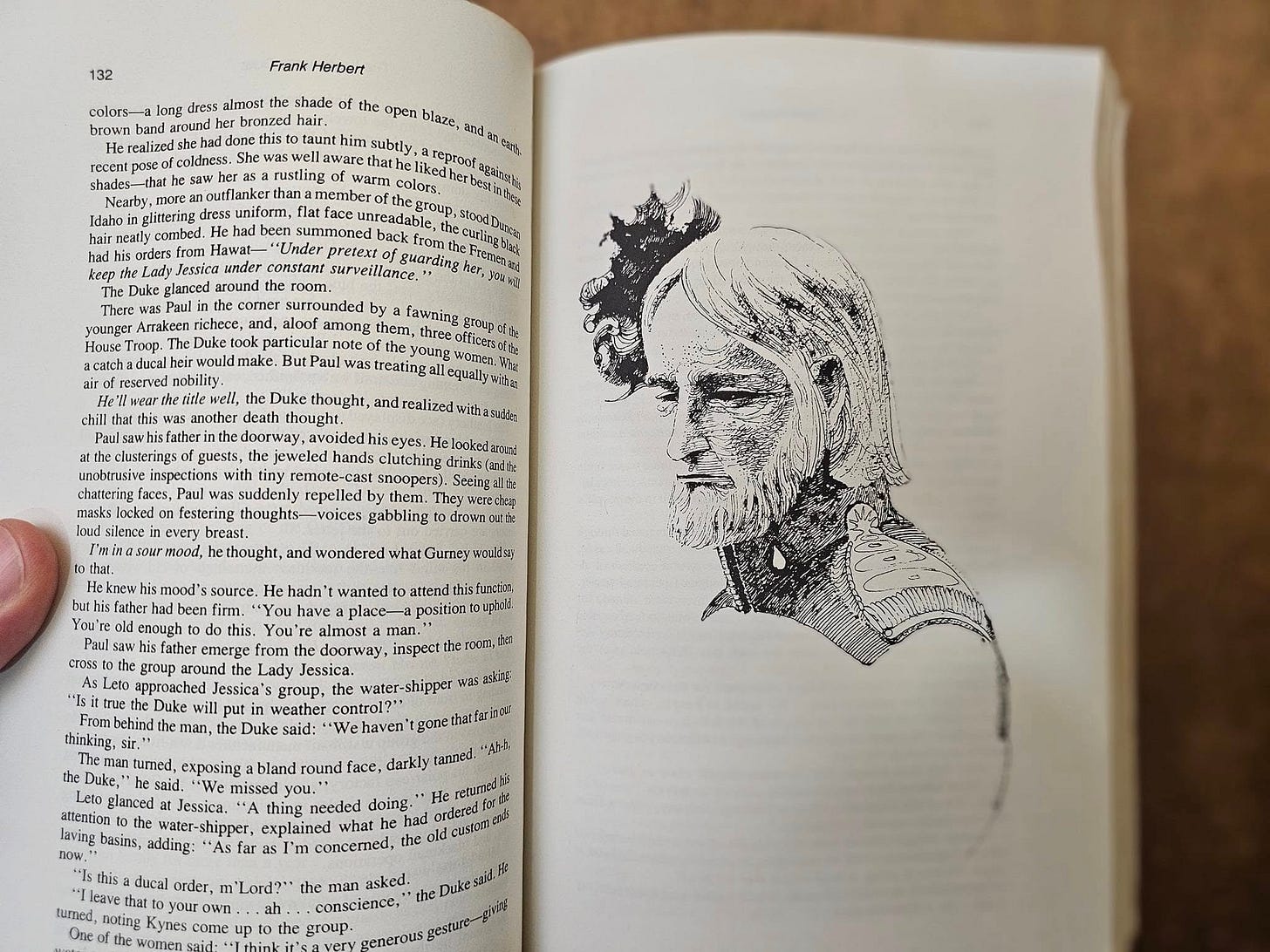You Are Your Own Worst Enemy | The Philosophy of Dune
Dune Read-Along Companion Essay 3
“Beware that, when fighting monsters, you yourself do not become a monster... for when you gaze long into the abyss. The abyss gazes also into you.”
―Friedrich W. Nietzsche
Welcome to the Parker’s Ponderings Dune in June (and some of July) Read-Along. This is the third of six companion essays that I’m writing for those reading through Dune with me.
I’m looking forward to hearing from you all as well, so make sure to leave your own thoughts and favorite quotes from the sections in view down in the comments.
Here’s the reading schedule:
June 5th – pages 1-105, read until this epigraph “Over the exit of the Arrakeen landing field, crudely carved as thought with a poor instrument, there was an inscription…” and the first line of the main text: “The whole theory of warfare is calculated risk…”
June 12th – pages 106-205, stop before epigraph “There should be a science of discontent…” and the first line: Jessica awoke in the dark, feeling premonition…”
Zoom Book Club – Sunday, June 22nd 4pm central
June 19th – pages 206-305, stop before the epigraph “At the age of fifteen, he had already learned silence” and the first line: “As Paul fought the ‘thopter’s controls…”
June 26th – pages 306-407, stop before the epigraph “The concept of progress acts as a protective mechanism…” and the first line: “On his seventeenth birthday, Feyd-Rautha Harkonnen killed…”
Zoom Book Club – TBD
July 3rd 408-515, stop before the epigraph “When law and duty are one, united by religion…” and the first line: “The smuggler’s spice factory…”
July 10th – pages 516-616 (the end of the book, before appendices)
Zoom Book Club – TBD
If you like my work and want to support it/get access to exclusive content and access the Zoom book club sessions, consider becoming a paid subscriber:
Or, if you just want to say a one-time thanks, consider buying me a coffee:
Our first Zoom Book Club session is happening on this coming Sunday, June 22nd at 4pm central!! This is for paid subscribers only so make sure to upgrade to paid before then to join us. You can find the link all the way at the bottom of this post past the pay wall or in our paid subscriber chat!
You Are Your Own Worst Enemy
We’re halfway through Dune! What do you think so far? Are you glad you decided to read it with me this summer? Are you glad you decided to reread it? Leave me a comment and let me know what’s been your favorite part of the novel thus far.
Throughout our third reading here, more and more emphasis is put on the vices of the Harkonnens. The Barron has twisted his Mentat, Piter De Vries, into a treacherous murderer and has enlisted his help to likewise subverted a suk school doctor, Dr. Yueh. The Harkonnens override Yueh’s conditioning and turn him into a murderous traitor—showing that vice corrupts even the supposedly incorruptible and can twist even the sage. Yueh, once broken of his conditioning, is free to betray the Atreides, but he’s also free to betray the Barron as well. Be careful when creating traitors—you’ll end up with traitors in your own midst!
The Harkonnen Personification of Vice
The Barron has no loyalty to Piter, who dies by the poison exhalation of Duke Leto, nor is he loyal to his other men who died in the attack meant for himself. He easily replaces his first in command with Nefud, and adds that Nefud will be easy to control since he’s addicted to the drug semuta—vice upon vice upon vice.
This may be reading into the text a bit too much here, but we might see the Harkonnens as the polar opposites of the four cardinal virtues:
Nefud, the timid drug addict = weakness and cowardice, the opposite of Gurney Halleck the courageous.
The Beast Rabban = foolishness, the “muscle-minded tank brain” (298), which is the the opposite of Thufir Hawat, the wise.
Piter De Vries the twisted Mentat, who sought his own duchy beyond his station, and is a torturous monster = imprudence/evil, the opposite of Duncan Idaho, the moral and prudent.
The Baron = injustice, for his twisting of a healer into a murdering traitor; the twisting of a Mentat into a conniving butcher; for his plot to wipe out the entire Atreides family line; for breaking the rules of the convention and covering it up; for hiding pertinent information from his co-conspirator, the Emperor; for his pedophilia and gluttony; for emphasizing power and fear as his tools of statecraft, and on and on. The Baron is even compared to the blasphemous beast of Revelation 13:1 by Gurney on pg. 231 in case you didn’t get how bad the Baron is. He is the obvious polar opposite to Duke Leto, the just.

Leto and Christ?

The Baron’s injustice reaches a crescendo with the demise of Duke Leto, who is sort of depicted as a Christ figure? Leto is betrayed by his own Judas Iscariot, Wellington Yueh, into the hands of the empire, which is space Rome. The Sardaukar (imperial soldier) tears off the Atreides hawk insignia from Duke Leto’s clothing, reminiscent of the Roman soldiers tearing Jesus’s robe and casting lots for the pieces. The Sardaukar then passes Leto off to the Baron who is maybe a Pontius Pilate figure?
No one took Leto’s life from him, he laid it down of his own accord like Christ said of himself in John 10:18 and his death is meant to vanquish his foes, just as Christ’s death meant victory for Christ over his enemies, sin and death. Though Christ’s death accomplished what it was meant to, whereas Leto ultimately failed to destroy his beast. But even though Leto failed to rid his family of the threat posed to it by the evil Baron, he did remain in the trap, enduring the pain, feigning defeat that he might kill the trapper just as the Reverend Mother told Paul that a true human would do when caught in a trap (10).
The Enemy Within
The Harkonnens are evil, twisted humans, but they are humans none-the-less, not animals as it turns out. The whole Bene Gesserit distinction between humans and animals, seems to be eugenicist propaganda after all. Why think that? Paul says as much to his mother, Jessica: “The Harkonnens! … Put those twisted humans out of your mind.” (251). To which Jessica tries to quickly admonish her son in reply, warning him not to refer to people as humans without—she’s interrupted but presumably she was going to say with out the Test (of the gom jabbar).
Paul interjects “Don’t be so sure you know where to draw the line… we carry our past with us. And, mother mine, there’s a thing you don’t know and should—we are Harkonnens.” (251).
This is one of my all-time favorite parts of Dune! We get this massive revelation that Paul is a freaking Harkonnen!!! And not just any old Harkonnen—he’s the Baron’s own grandson through Jessica!!! C’mon! So not all Harkonnens are animals, because Paul himself is the direct heir to the Harkonnen barony and he has been proven ‘human’ by the gom jabbar.
So at this point in the story, we’ve learned that Paul may be the Bene Gesserit’s messiah, the Kwisatz Haderach; He’s been trained to be a Mentat-Duke—which he’s now realized with the death of his father in our reading for this week, so he’s the rightful ruler of Caladan and Arrakis; He’s a cousin of the emperor, so he’s got royal blood; he may be the Fremen’s Mahdi and Lisan al-Gaib; and now we find out he’s the rightful heir of the Harkonnen’s Barony, both on Geidi Prime and in whatever claim they have on Arrakis, through his maternal grandfather, Baron Vladimir Harkonnen!!

Paul Reborn
Paul and Jessica survive the attempt on their lives. They flee into the desert to wait for Duncan Idaho. While waiting in the stilltent Paul undergoes the pangs of childbirth and the sleeper is awakened (248). The stilltent is a metaphorical womb, and Paul’s mother is even present with him trying to guide him through his untimely awakening. The childhood in Paul’s voice is replaced with steel and bitter strength. His Mentat reasoning is at full capacity, he begins having prescient waking dreams, and his mind continues to climb to different rungs of awareness thanks to the presence of the spice, which continues to call his latent potential toward full actualization. Jessica begins to fear her own son as she watches his transformation in the stilltent womb.
Paul is filled with his terrible purpose now. Is he the Kwisatz Haderach then? He claims to be something else, something unexpected, arriving before his time (252). But whatever he is, Paul emerges from the stilltent a new man, a man reborn. He begins scheming about blackmailing the emperor, suddenly has designs for the imperial throne itself, and begins planning to hold the whole planet hostage with his Atreides family nukes! Power, fear, and blackmail—the tools of his grandfather’s statecraft. Through his prescience, he sees two paths, one where he personally confronts his grandfather, the Baron Harkonnen, and the other which is a massive space jihad, a truly terrifying prospect. At least Paul is not thrilled about the jihad though, we can give him that.
Paul’s natural leadership talents are on full display in his new state as he quickly transforms Liet Kynes from imperial planetologist and unofficial guerrilla king of Arrakis into his own subject. Paul first tries to pull rank on Kynes by emphasizing his rightful position as Duke of Arrakis. Kynes doesn’t go for it. Next, Paul tries the Lisan al-Gaib card. Kynes likewise is not swayed. But when Paul offers to buy the loyalty of Kynes with his own loyalty towards Kynes, Kynes is instantly persuaded and refers to Paul as ‘sire’ in earnest for the very first time (285). This creates yet another avenue for Paul to rule, another gem in the ever-growing diadem: the unofficial king of Arrakis, Liet Kynes, now bows to Paul Atreides as well.
The Overemphasized Psychologizing
With this latest read-through of Dune, I’ve been focusing more and more on the philosophical psychology of Dune. It’s not without warrant, Herbert admitted that his novel might rightly be labelled ‘philosophical fiction’ over ‘science fiction’ and he’s acknowledge his intentional appropriation of Jungian psychology. But I’m really starting to think that perhaps Dune as a whole is a sort of novel length Jungian critique of, or at-least play on, Plato’s Republic, and as far as I can tell, that’s a unique insight—if it bears out. But it is totally possible for me to take the psychologizing too far. In fact, I think I’m about to do that, here goes:
Psychological reading thus far: Herbert has personified justice as Duke Leto, courage as Gurney Halleck, wisdom as Thufir Hawat, and prudence/morality as Duncan Idaho. He’s said that these four things, which happen to be the four cardinal virtues of ancient philosophy, are the foundations of a world, also an ideal city-state (Plato’s Republic). But all of these are nothing without a ruler who knows the art of ruling, which is meant to be Paul, the heir to… well to everyone by now! He is everyone’s messiah. But how is he to rule well when justice, his father is dead; when wisdom, one of his mentors, Thufir Hawat, is held captive by his mortal enemy; when courage, Gurney, is presumably in tact but in exhale with the smugglers; and when righteousness/prudence, Duncan, is also dead? This does not bode well for the young would-be philosopher-king, Paul.
But that’s more of the philosophical reading. If we go really deep into the psychological eisegesis we might see, in this third chunk of reading, Herbert’s deep criticism of those who seek out power. Herbert rejected the maxim “power tends to corrupt, and absolute power corrupts absolutely” put forth by Lord Acton, an English Catholic historian and politician, in an 1887 letter to an Anglican bishop. Instead, Herbert thought it was the corruptible who sought power in the first place.
Here, in this week’s reading, we might see the psychology of the power hungry leader. The power hungry would-be leader has killed their own sense of justice, just as Paul’s grandfather, the Baron, killed his father, the personification of justice, Duke Leto. Paul’s evil, his Harkonnen side, has prevailed thus far against his good side, his Atreides side.
We see the power hungry would-be leader allow his royalty to likewise kill his sense of prudence, personified by the Sardaukar, whose looks remind the Baron of Duke Leto, and who represent the emperor—who is cousin of Duke Leto and Paul, and who is said to actually resemble the Duke a lot as well—and who are dressed in Harkonnen clothes, kill Duncan Idaho, the personification of Paul’s morality.
We see the wisdom of the power hungry would-be is leader held captive and poisoned by greed, injustice, and folly, personified by Thufir’s capture at the hands of the Sardaukar and subsequent delivery to the Baron.
And we see courage still intact but not tempered by the other cardinal virtues in the isolation of Gurney Halleck, the ronin, the samurai without a master.
It’s after the loss of his father, that the sleeper in Paul awakens and he’s reborn as something new, something with big grandiose plans to steal the imperial throne and exact vengeance on all who’ve wronged him. But in this psychological reading, we see that Paul has done it to himself, for he is the Harkonnens, he is the Atreides, he is the imperial family. He is eternally at war with himself. The monster lives within him, and he’s just been awakened…
“Beware that, when fighting monsters, you yourself do not become a monster... for when you gaze long into the abyss. The abyss gazes also into you.”
―Friedrich W. Nietzsche
Okay, see I told you it’s probably too much psychologizing. Is it a plausible reading? Ehhhh, maybe. But I don’t know, you tell me. Leave me a comment.
If you enjoyed this essay or any of the others in this series then leave me a like here and a comment letting me know what you think so far. I want to keep these essays free but they are a ton of work. Yes, it’s a labor of love, but if you want to help support me and help me continue to love this labor, then consider buying me a coffee:
Find the Zoom link to our virtual book club session #1 below this paywall. Thanks for all the support and I can’t wait to talk with you all about the book this coming Sunday, June 22nd at 4pm central!







